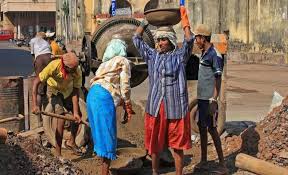Migrant labour form the backbone of big city development in various sectors, and especially in construction. The money earned by these migrants help to ease their poverty in their home villages. Yet, government planners and agencies treat these legal migrants like illegal residents. A working paper recently published by two Jesuit institutions in Patna, draw attention to this dilemma.
The phenomenon of ‘forced migration’,’ involuntary migration’ and ‘distress migration’ operates within the majority of the rural population of Bihar, especially among the Dalits, most backward classes and tribals, who are ‘landless agricultural labourers’. The government lockdown strategies during the first two waves of covid-19 served to deepen that distress, according to a working paper authored published by the Bihar based Xavier Institute of Social Research (XISR).
The working paper, ‘Distress Migrants of Bihar: Factors, Causes, and Responses,’ authored by Jesuit academician and social scientist Dr Prakash Louis SJ was released at a function in the St. Xavier’s College of Management and Technology(SXCMT) on Sunday, June 26.
“According to the 2011 census, Uttar Pradesh and Bihar are responsible for the greatest number of migrants, as 20.9 million people migrated from outside the state from these two states,” says Father Prakash. “however despite the large scale of migration in absolute numbers, labour migration has rarely been reliably studied.”
The paper, jointly published by XISR and SXCMT, asserts that Covid-19 had a debilitating effect on the migrants, especially from Bihar and Uttar Pradesh.
On the other hand, the paper argues that there is building evidence that migration can have positive outcomes for the poor. Money earned from labour are applied to health care, education and to repay debt. Despite increasing research along these lines, urban development projects seek to keep migrants out, local authorities treat labour migration as a problem, and migrants are exposed to police harassment because they are considered closer to illegal residents than legal migrants.
According to the paper, when Jesuit researchers Martin Poras and Prakash Louis undertook a study of the state of returnee migrants in 2020, it was found that most of the labour migrants from Bihar are from the historically oppressed communities stigmatized as untouchables and lower castes. A vast number of these worked in the unorganized sector, which is the backbone of the Indian economy. ‘Now this is in disarray due to lockdown and shutdown. Along with the migrants, the economy of the country was badly hit,’ the paper claims.
At a time of deep crisis, instead of progressive labour laws, the rulers have opted for regressive ‘reforms’, violating domestic and international conventions, and constitutional protections, it says.
“Reliable data and research is essential for the framing of effective government policies, as well as for civil society responses to migrants and migration. XISR will soon be coming out with a field based research study ‘Impact of Covid-19 on the Migrants and their families of Bihar’. It is the result of a six month long study that mainly focuses on employment, health and educational aspects,” says Prakash Louis.
A joint field based study by XISR, Patna and Sahyog, Gujarat on the ‘Impact of Covid-19 on the Dalits of Bihar and the Tribals of South Gujarat’ is also under way.
Father Prakash Louis is currently the coordinator of the Bihar Migrant Hub of MAiN (Migration Assistance and Information Network). This collaborative venture, operative in 14 states, evolved from the Indian Jesuit response to the covid-19 pandemic. It’s stated purpose is to ‘Accompany, Serve, and Advocate for the Distressed migrants.’




Migrant labourers are behind their contribution towards Indian economy.
The strategised professes to kill their hunger and poverty as they migrate from rural to urban cities. These labourers are mostly poor, backward castes and tribals from Uttar Pradesh and Bihar. They work predominantly to acquire salary in terms of bequeathing comfort to their family members.
These labourers are premediated disrespectfully and are humiliated despite understanding their difficult circumstances by the government and the renowned agencies.
This blog is a nostalgia towards the tribal, backward castes people and their life delved in abode of poverty. So, I would like to say that these people are truly the backbone of the urban cities in replica of Indian economy which is only enlightened by the sincerity and the consistency of hard work by the migrant labourers.
Migrant labourers are behind their contribution towards Indian economy. This is true because they migrate from rural to urban areas and discover job as a labourer working throughout the day and night to ease their poverty. But the question which arises here are they treated in a good manner or are they treated illegally or badly by the government and the superiors of certain agencies who hardly think about the labourer’s circumstances? The answer which professes here is that they are enforced to work substantially and also are not paid in consonance to their prospect despite their consistent efforts and hard work.
The village people of Bihar and Uttar Pradesh predominantly migrate to urban areas and the paradox of these forced labourers is to kill their hunger and poverty and earn better salary to help their family members.
Being the migrant labourer and their cynicism of life from where they mostly come then we would acknowledge many reasons of their miseries from which they are crossing over through in terms of their sustenance in life.
So, I would say the poor or migrant labourers should not be treated or humiliated disrespectfully because it’s natural every human being has their own self-respect and dignity which they should maintain and should not be biased or judgemental towards others in respect of humiliating others.
This blog was a nostalgia towards poverty, hunger,backward castes people in replica of their journey towards their struggled and tragic life.